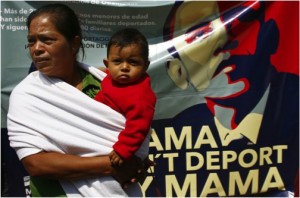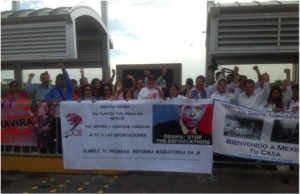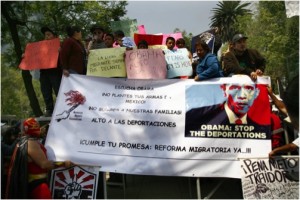 By Marta Sánchez, Elvira Arellano y Emma Lozano
By Marta Sánchez, Elvira Arellano y Emma Lozano
During President Barack Obama’s recent visit to Mexico, hundreds of migrants and rights activists in four cities protested Obama’s deportation policies and called for inclusive, comprehensive immigration reform in the United States.
The Mesoamerican Migrant Movement joined Familia Latina Unida (Latin Family United) of Chicago in a binational campaign to influence U.S. legislators to define broad criteria for legalization, as Obama’s trip to Mexico coincided with the debate over immigration reform in the United States. Their campaign, called the “Saulito Project”, calls on Congress to include migrants such as Saulito’s mother, activist Elvira Arellano, who have children who are U.S. citizens. When these children’s parents are deported, it divides their families in direct violation of the rights of children, since part of the family remains in the United States.
The campaign began April 28 with a press conference on the International Bridge of Laredo/Nuevo Laredo. On April 29, participants delivered letters from children affected by deportations to legislators in San Antonio, Texas. On Wednesday, May 1, Saul Arellano led the May 1st March in Chicago, Illinois.
On May 2–the day Obama arrived in Mexico to meet with Mexican President Enrique Peña Nieto–protesters gathered in front of the U.S. Embassy in Mexico City. More than 600 people read and delivered the children’s letters.
National campaign to avoid family separation
Since 2008, in response to President Obama’s negligence in guiding Congress to reform immigration laws, Familia Latina Unida and Congressman Luis V. Gutiérrez of Chicago initiated a national campaign to avoid family separation and the trauma for children caused by the deportation of their parents called “The Children’s Campaign”.
The campaign is premised on Obama’s statements during elections, when he noted that to split up a single family hurts the whole U.S. community. However, as president deportations and persecution of undocumented migrants has broken records, dividing families, increasing incarceration, and leading to the abandonment of minors. The Obama administration has reached unprecedented numbers in these areas.
During Obama’s first four years in the presidency (2009-2012), nearly 2 million people were deported—more migrants than in the previous twelve years together. Currently, some 1,400 people are deported every day and most of those detained and deported are undocumented migrants from Mexico and Central America. The socioeconomic impact of the deportations for immigrant families is impossible to calculate. Migrant families suffer harassment and trauma.
Five million children and 1.6 million youth who are citizens of the United States are in danger of losing their families, and some 200,000 have already left the country deported in practice when their mother, father or both were deported. Their lives show the huge contradiction between Obama’s speeches on family unity, using his own family as an example in election commercials, and on the other hand hiding the drama of families separated by current immigration policies.
When children are ripped out of their familiar surroundings and inserted in a new culture, language and school system against their will, the boys frequently respond with aggressive behavior and the girls show signs of depression. One of the most serious consequences for children who face the effects of separation in their homes is the inability to adapt and get along with other children, so they often suffer being left out, voluntarily or by force, which leads to loneliness and serious depressive disorders.
The children of families divided by deportation of one of their parents lose self-esteem, feel abandoned and suffer serious mood changes. The situation gets worse because the families often lose their source of income and face financial hardships, lose their homes or can no longer pay the rent and have to live in over-crowded housing with relatives, face scarcity of food, and the mother or father who remains in charge of the children must spend more hours working to survive, adding to a feeling of abandonment in the children. The children of divided families have higher levels of frustration, anger and stress-related illnesses such as frequent stomach pain, difficulty concentrating, migraines and panic attacks. Also researchers have found that children are afraid to leave their houses and interact socially and tend to associate the word “migrant” with something very negative and shameful.
Letters to Obama on the international Bridge 
Nuevo Laredo, April 28. At the railings of the international bridge “Bridge to the Americas” that joins the border cities of Nuevo Laredo, Tamaulipas and Laredo, Texas, activists delivered the letters of U.S. children and youth who hope that their parents receive the benefits of immigration reform. In the event on the bridge that divides the two countries, they read the letters written to President Obama by children born in the United States who live in Mexico because one or both of their parents were deported and of children who live in the United States and their parents are facing deportation processes or were already deported.
On the U.S. side, Rosalba Valdés joined the protest. Rosalba wrote the song “Se llevaron a mi Padre” (“They Took My Father”) when she was just 11 years old. The song tells the story of the tragedy she experienced when her family was separated. She delivered the letters of children who remain in the United States, while on the other side of the bridge, Saul Arellano delivered the letters of children who moved to Mexico. Saul Mañón Arellano is the 14 year-old son of Elvira Arellano, a well-known activist for migrant rights and member of the Mesoamerican Migrant Movement and La Familia Latina Unida. Arellano was deported in 2007 to her birthplace in the state of Michoacán after having taken refuge for a year in the Adalberto United Methodist Church in Chicago, Illinois.
“This is so my mother and other parents are included [in the reform], so that others don’t have to go through what me and my mother went through,” Saul said.
Members of Congress receive letters in Texas
San Antonio, Texas. April 29. As part of the Children’s Campaign led by Saul and Rosalba, a kids’ delegation deliver the letters to Obama to representatives Lloyd Dogget of Texas and Luis Gutiérrez of Chicago, in a public hearing. “Britzi” Lino, another girl from the Chicago delegation, explained that she is facing the deportation of her mother scheduled for May 2. The children’s campaign will continue to collect letters from children in the United States, Mexico and Central America to take to Washington D.C. the beginning of June and deliver to President Obama and members of Congress.
Saul was only three when he witnessed the arrest of his mother in their home in Pilsen. For the past six years, after being deported, they live in Michoacán. His dream is to see her cross the border and enter the United States legally.
“I’ve been doing this for ten years and I’m not going to stop until there is immigration reform,” said Saul. “I have big dreams, I want to be a great soccer player, or doctor in both countries, to help migrants and to have my mother with me. I think that President Obama has a heart and will listen to us.”
Congressman Luis Gutiérrez of Chicago promised to lead the delegation of children to Washington, DC. to present the letters from the Children’s Campaign to Obama. The letters were written by children who are U.S. citizens with families from Central American and Mexico, as well as letters from children who live in the United States and live under the constant threat that some day their parents will no longer be there when they get home.
In Mexico City: “I want Obama to stop the destruction of families” 
Mexico City. May 2. Some 600 people gathered at the gates to the U.S. Embassy to protest, called by the Mesoamerican Migrant Movement. Members of the Mexican Electricians Union (SME) and of the Binational Coalition of Ex-Braceros also supported the demonstration.
A group of children born in the United States of undocumented migrant parents from Maravatio, Michoacán, accompanied by relatives, came to the embassy to read their letters to President Obama asking for the president to use his executive power to put an end to deportations during the process of legislating immigration reform and to allow the reunification of Mexican families.
“I’m here so that Barack Obama lets my parents come to my country,” said Vladimir as his mother, Veronica, held up a sign saying “Obama, keep your promise”.
“To be illegal is terrible, there are lots of bad experiences,” said Veronica. “When they deported me, I said ‘OK, here is my country, here I at least I won’t be afraid but I didn’t think about what my son wanted.” Vladimir dreams about returning to his country of birth.
Others demanded that Obama stop the hypocrisy of saying he wants immigration reform to keep families together and then carrying out extensive raids and deportations.
The Children’s Campaign has simple demands:
Moratorium on deportations and the separation of families: It makes no sense to deport people and destroy families that could soon acquire legal immigration status. Up to now, President Obama has not used his executive power to do suspend deportations, although he did use it to relieve the situation of students. During the time that legislators take to discuss and pass immigration reform some 500,000 people without documents will be deported if the process continues at its present speed.
Inclusion: Our major concern is for MAXIMUM INCLUSION. We want reform to include the broadest number of people, admitting those who have been deported and returned to be with their families, those who were detained in a first crossing and have a record of expedited deportation, or those who do not have permanent work as day laborers, or those who have a criminal record for only minor offenses like driving without a license. But above all we are fighting for “the right to return” for those who have been deported and have children who are citizens or close family in the United States. The cruel irony of offering student youth legal immigration status while deporting their undocumented parents is unacceptable and profoundly inhumane.
These are the issues that should be in the discussion on immigration reform, but are not put forth unless migrants themselves and their children put them on the table.
Despite that Obama’s candidacy could not have been successful without the support of racial minorities that filled the streets in 2007 when the Sensenbrenner migration bill was passed, and despite that the vote of Latinos carried him to the White House in both 2008 and 2012 with the support of 70% of the Latino vote, Obama has refused to stop the massive deportations an call for a moratorium while the new immigration reform is being hammered out. He is aware of his power and authority to do it through an Executive Order, but claims that it would be an authoritarian action and so he will not use it. His idea of building consensus on a new immigration policy is reduced by certain sectors that do not like the idea of stopping deportations of human beings they have labeled as delinquents, illegals and even potential terrorists.
Obama talks about 11.1 million undocumented migrants who will benefit from immigration reform and will have a social security number that allows them to work and a driver’s license that allows them to travel to their workplace. Nearly 8 million are of Mexican origin, along with their children born in the United States who also number in the millions.
This debate will go on until Congress approves the immigration reform proposed by the Senate that has as a conditions the strengthening of border controls for homeland security, the implementation of guest worker programs in different categories and regularization with possible citizenry in a period of 13 years of waiting in addition to the payment of fines that guarantee the self-financing of the administrative and bureaucratic costs.
The Mexican government has decided not to get involved in lobbying so as not to build up false hopes in the migrant community. However, its decision to abstain not only implies that it has been excluded but also demonstrates the poor participation in the defense of the human rights of its people.
In terms of budget and policy, there are no programs to take care of the 1,500 people deported a day. Not to mention the protection of Mexicans in the 50 Mexican consulates in the United States, which, except for rare cases, are only a refuge for exiled politicians with pretentions of returning for better political posts and opportunities. The data base of the ministry of Foreign Relations and the statistics on protection on its web page show that efforts to attend to the needs of Mexicans aboard are minimal: in 2012 they only attended 186 cases of violations of human rights. This begs the question of whether the diplomatic corps or the staff of the Mexican Consulates considers separation of families, abandonment of children, massive deportation in workplaces and in Mexican communities human rights concerns. Perhaps they do not know that since 2011 the reform of Article 1 of the Constitution obliges the State to promote, respect, protect and guarantee human rights in accordance with the principles of universality, interdependence, indivisibility and progressivity.
For these reasons we have united throughout the Untied States, Mexico and Central America to give voice to the children and undocumented migrants in the debate on immigration reform, because the growing politicization, form the Republicans and the Democrats, reduces the discussion to the search for electoral advantages in the next elections.
Women of the Movimiento Migrante Mesoamericano and La Familia Unida:
Marta Fernanda Sanchez is the daughter of a Spanish refugee, who has lived in Spain, France, the Mexican border and the United States. She worked to form production cooperatives in poor areas of Baja California and served as an adviser to programs of popular education and the formulation and evaluation of productive projects. She currently heads the Mesoamerican Migrant Movement (M3 No Nos Vamos) devoted to making public the situation of Mesoamerican migrants as they pass through Mexico.
Elvira Arellano is from San Miguel Curahuango, Maravatio, Michoacán, México, and emigrated to the United States entering without immigration documents. On August 18, 2007, ICE agents arrested her with force and eight hours later deported her. Her case has become an international symbol of the struggle of undocumented migrants. She now lives in Maravatío and is a member of Somos un Pueblo sin Fronteras in Chicago, Illinois, and La Familia Latina Unida, an organization she formed to defend the rights of children born in the U.S. of one or both undocumented parents. She is also a member of the Movimiento Migrante Mesoamericano and the network MIREDES, International.
Emma Lozano is from a family of grassroots leaders. Her brother, Rudy Lozano, was a legendary community activist who was murdered in 1983, considered the first Mexican martyr in the modern fight of workers and migrants. Emma heads the organization “Somos un Pueblo Sin Fronteras” and is director of “La Familia Latina Unida” where she works to stop raids, deportations and family separation and pressures President Obama to act in favor of immigration reform.



